Churches, as pillars of communities, fulfill essential roles in fostering spirituality, support, and service.
However, the upkeep of these sacred spaces often involves substantial energy expenditures.
To mitigate financial strains and champion sustainability, energy grants for churches emerge as invaluable resources.
These grants furnish financial support for the implementation of energy-efficient initiatives and renewable energy solutions within church premises.
In this discourse, we delve into the intricacies of procuring energy grants for churches, elucidating the application process and elucidating the manifold advantages they confer upon congregations and their surrounding communities.
What are Energy Grants
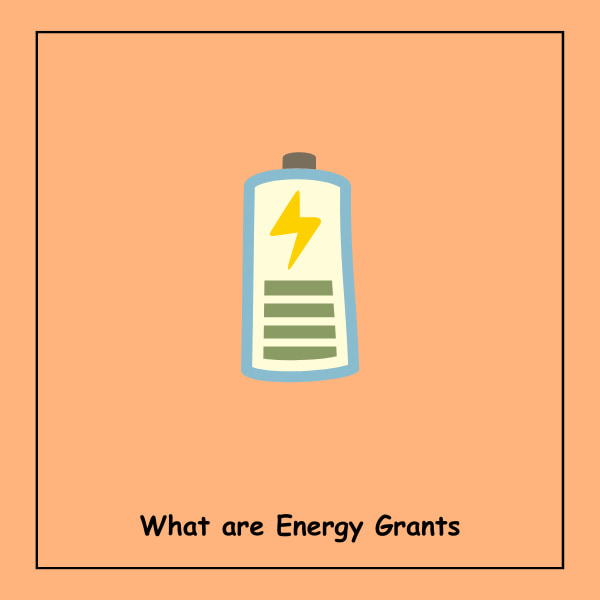
Energy Grants are instrumental financial resources extended by diverse governmental and non-governmental entities to foster energy efficiency and bolster the integration of renewable energy technologies.
These grants epitomize a concerted effort to incentivize initiatives aimed at curtailing energy consumption and curbing environmental degradation.
By incentivizing the adoption of sustainable practices and technologies, energy grants play a pivotal role in advancing societal and environmental well-being.
What are the Get Energy Grants for Churches Application
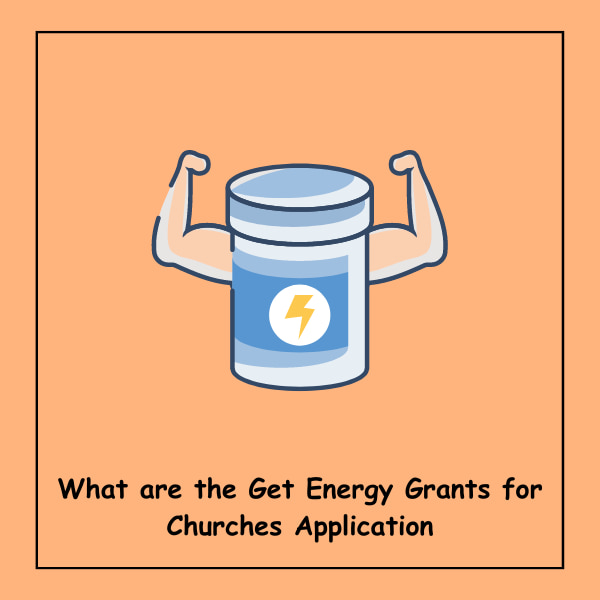
The process of applying for Get Energy Grants for Churches requires meticulous planning and attention to detail.
To begin, churches should conduct thorough research to identify available grant opportunities tailored to their energy efficiency needs.
This entails exploring governmental and non-governmental organizations offering such grants and understanding the specific criteria and requirements for each program.
Once potential grants are identified, churches must carefully review the eligibility criteria outlined by each granting organization.
These criteria often include factors such as the church’s non-profit status, its financial stability, the proposed energy efficiency improvements or renewable energy installations, and the intended use of the grant funds.
It’s essential for churches to ensure that they meet all eligibility requirements before proceeding with the application process.
After confirming eligibility, churches must gather all necessary documentation to support their grant applications.
This may include proof of non-profit status, such as 501(c)(3) certification, property ownership or lease agreements for the church facilities, financial statements demonstrating the organization’s financial health and ability to match funds if required, and detailed project proposals outlining the planned energy efficiency measures and their anticipated impact.
Crafting a compelling project proposal is crucial to securing Get Energy Grants for Churches.
Churches should clearly articulate their energy efficiency goals, outline the specific improvements or installations they plan to implement, and demonstrate how these initiatives will contribute to energy savings, environmental sustainability, and community engagement.
Providing comprehensive and well-researched project plans can significantly enhance the church’s chances of success in securing grant funding.
Once all documentation is in order, churches can proceed to complete the application forms provided by the granting organizations.
It’s important to pay close attention to the instructions and guidelines provided and to ensure that all sections of the application are accurately and thoroughly filled out.
Any missing or incomplete information could jeopardize the church’s chances of receiving funding.
Finally, churches must submit their completed applications within the specified deadlines and be prepared to follow up with the granting organizations as necessary.
This may involve providing additional information or clarifications, attending interviews or presentations, or participating in site visits to assess the proposed energy efficiency projects.
By navigating the Get Energy Grants for Churches application process with diligence and professionalism, churches can increase their likelihood of securing valuable funding to support their sustainability initiatives and advance their mission of service to their congregations and communities.
How to Get Energy Grants for Churches Application
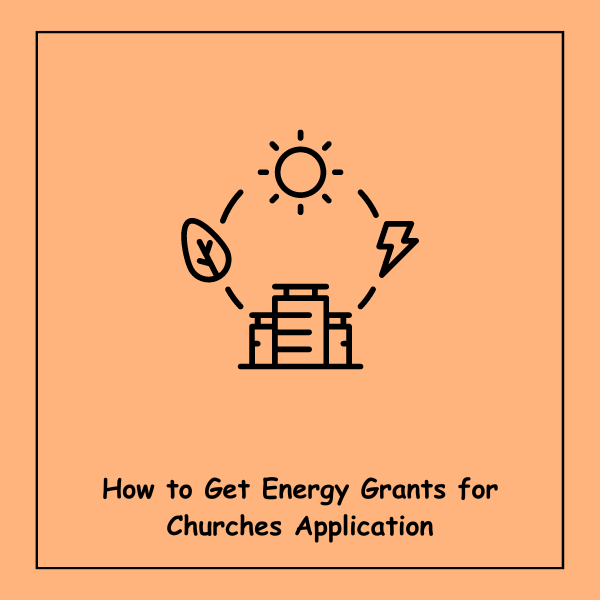
Securing Energy Grants for Churches necessitates a thorough understanding of the application process and diligent preparation.
To commence, churches should embark on comprehensive research to identify suitable grant opportunities tailored to their energy efficiency goals.
This entails exploring various sources, such as governmental departments, non-profit organizations, and private foundations that offer grants specifically designed for churches.
Once potential grants are identified, churches must meticulously examine the eligibility criteria outlined by each grant provider.
These criteria typically include requirements related to the church’s non-profit status, financial stability, intended energy efficiency projects, and the community impact of proposed initiatives.
Churches must ensure that they meet all specified criteria before proceeding with the application process.
After confirming eligibility, churches should compile a comprehensive set of documentation to support their grant applications.
This documentation often includes proof of non-profit status, such as 501(c)(3) certification, as well as evidence of property ownership or lease agreements for the church facilities.
Additionally, churches may need to provide financial statements demonstrating their ability to match funds if required by the grant program.
Crafting a compelling project proposal is essential to successfully securing Energy Grants for Churches.
Churches should outline their energy efficiency objectives clearly, detailing the specific improvements or installations they plan to undertake and explaining how these initiatives will contribute to energy savings and environmental sustainability.
Providing concrete data and research-backed projections can strengthen the credibility of the proposal and enhance the church’s chances of receiving grant funding.
Once all documentation is prepared, churches can proceed to complete the application forms provided by the granting organizations.
It’s crucial to pay close attention to the application instructions and ensure that all sections are accurately and thoroughly filled out. Any discrepancies or omissions could potentially jeopardize the church’s chances of securing funding.
After submitting the application, churches should be proactive in following up with the grant providers as necessary.
This may involve responding to inquiries, providing additional information or documentation, or participating in interviews or site visits to further elucidate the proposed projects.
By navigating the Energy Grants for Churches application process with meticulous attention to detail and professionalism, churches can significantly enhance their prospects of securing funding to support their sustainability initiatives and further their mission of serving their communities.
Eligibility Criteria for Energy Grants for Churches Application
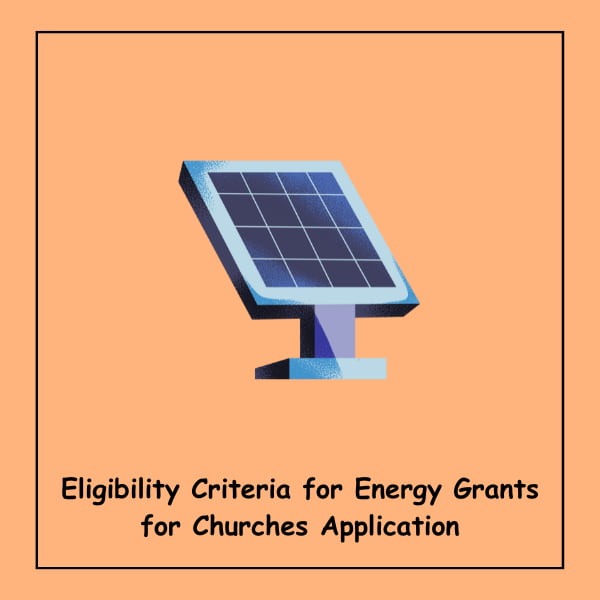
- Non-profit Status Verification: Granting organizations typically require churches to provide official documentation proving their non-profit status. This may include obtaining 501(c)(3) certification from the Internal Revenue Service (IRS) or equivalent registration with relevant governmental agencies.
- Demonstrated Need Assessment: Churches must demonstrate a genuine need for energy efficiency improvements within their facilities. This could involve conducting an energy audit to identify areas of inefficiency, high utility bills, or outdated infrastructure that necessitates upgrades.
- Alignment with Grant Objectives: Each grant program may have specific objectives or focus areas that churches must align with. This could include promoting energy conservation, reducing greenhouse gas emissions, or serving disadvantaged communities. Churches must ensure their proposed projects align with the goals of the grant program.
- Compliance with Legal Requirements: Churches seeking Energy Grants must comply with all relevant local, state, and federal laws and regulations. This includes adherence to building codes, zoning ordinances, and environmental regulations governing energy efficiency projects.
- Capacity for Project Implementation: Grant providers may assess the church’s capacity to successfully implement the proposed energy efficiency projects. This could include evaluating the church’s financial stability, organizational capacity, and ability to secure additional funding or resources if required.
Document Requirement for Energy Grants for Churches Application
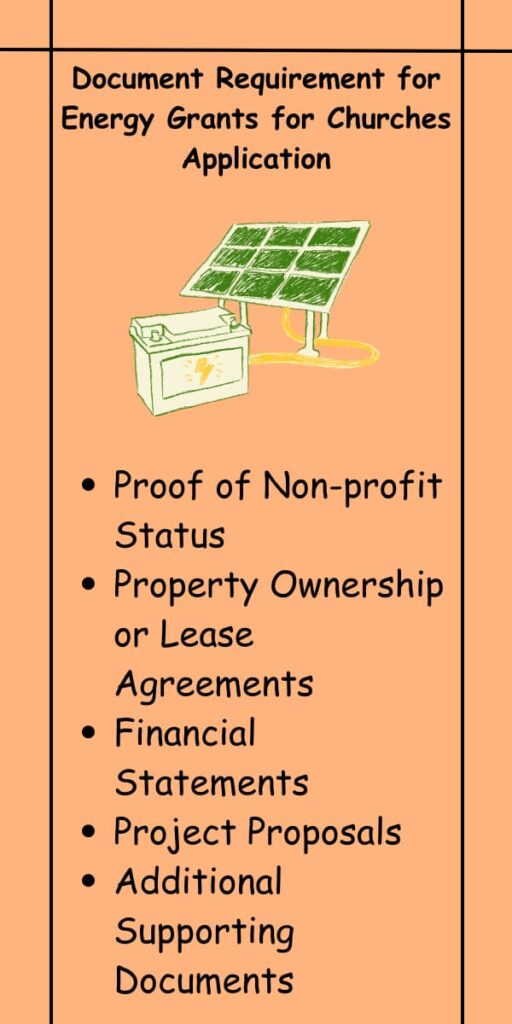
- Proof of Non-profit Status: Churches must provide official documentation verifying their non-profit status. This could include copies of the organization’s articles of incorporation, IRS determination letters, or state registration documents.
- Property Ownership or Lease Agreements: Documentation demonstrating ownership or lease agreements for the church facilities is essential. This could include property deeds, lease agreements, or letters of authorization from property owners.
- Financial Statements: Churches are typically required to submit financial statements, including balance sheets, income statements, and budgets. These documents provide insight into the church’s financial stability and ability to match funds if required by the grant program.
- Project Proposals: Detailed project proposals are critical components of the application process. These proposals should outline the specific energy efficiency measures to be implemented, along with timelines, budgets, and anticipated outcomes.
- Additional Supporting Documents: Depending on the requirements of the grant program, churches may need to provide additional supporting documents. This could include letters of support from community stakeholders, endorsements from local officials, or environmental impact assessments.
Application Process for Energy Grants for Churches Application
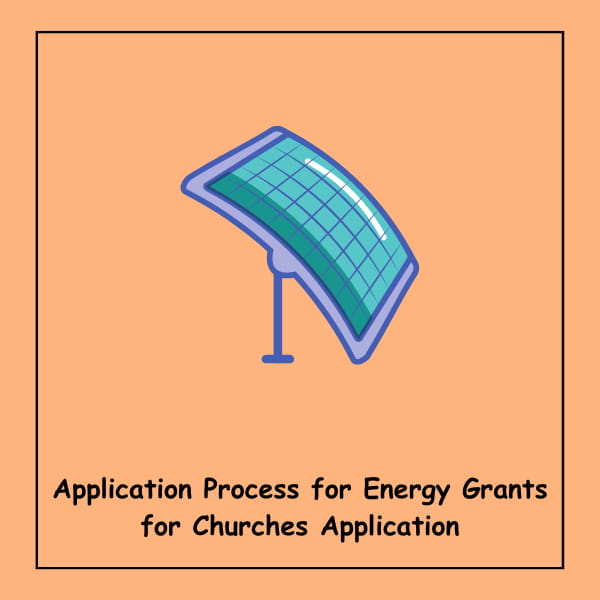
- Research and Identify Opportunities: Churches should conduct comprehensive research to identify potential grant opportunities that align with their energy efficiency goals and objectives.
- Review Eligibility Criteria: Carefully review the eligibility criteria for each grant program to ensure alignment with the church’s status and proposed projects. Pay attention to specific requirements and focus areas outlined by the granting organization.
- Prepare Documentation: Gather all required documentation, including proof of non-profit status, property ownership or lease agreements, financial statements, and detailed project proposals. Ensure all documents are organized and ready for submission.
- Complete Application Forms: Fill out the application forms provided by the granting organization accurately and thoroughly. Provide all requested information and double-check for completeness and accuracy before submission.
- Submit Application: Submit the completed application forms along with the required documentation by the specified deadline. Confirm receipt of the application and follow up with the granting organization if necessary.
- Engage in Follow-Up: Be prepared to engage in follow-up communication with the granting organization as needed. This may involve providing additional information, responding to inquiries, or participating in interviews or site visits.
- Await Notification: After submitting the application, await notification from the granting organization regarding the status of the application. Be patient during the review process and be prepared to provide any additional information or clarification if requested.
- Execute Grant Agreement: If the application is successful, churches will receive notification of grant approval and instructions for executing the grant agreement. Review the terms and conditions carefully and ensure compliance throughout the project implementation process.
- Implement and Monitor Projects: Upon receiving grant funding, churches can proceed with implementing the proposed energy efficiency projects. Monitor progress closely, adhere to project timelines and budgets, and document project outcomes for reporting purposes.
- Maintain Communication: Maintain open communication with the granting organization throughout the project implementation process. Provide regular updates on project progress, address any challenges or concerns promptly, and ensure transparency in all interactions.
What Are the Types of Energy Grants Provided to Churches?
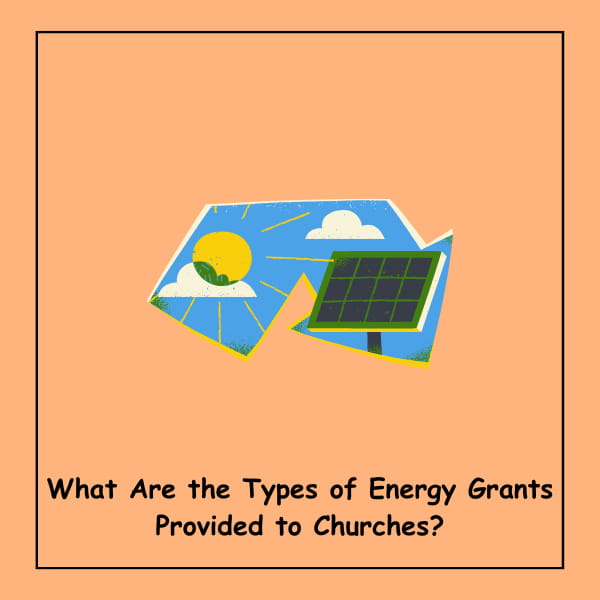
Energy Grants offered to churches encompass various categories tailored to support energy efficiency and renewable energy initiatives.
These grants play a crucial role in enabling churches to implement sustainable practices and reduce their environmental footprint. Here, we delve deeper into the types of Energy Grants available to churches:
- Solar Panels Grants: One prevalent type of Energy Grant is dedicated to funding the installation of solar panel systems on church rooftops or premises. These grants cover the upfront costs associated with purchasing and installing solar panels, allowing churches to generate clean, renewable energy and reduce reliance on conventional electricity sources.
- Energy Efficiency Grants: Another essential category of Energy Grants focuses on improving the energy efficiency of church facilities. These grants may support projects such as upgrading lighting fixtures to energy-efficient LEDs, installing programmable thermostats, or retrofitting insulation to minimize heat loss. By implementing energy-saving measures, churches can lower their utility bills and conserve resources.
- Renewable Energy Grants: Beyond solar panels, churches may have access to grants that support the adoption of other renewable energy technologies. This could include grants for installing wind turbines, geothermal heat pumps, or biomass energy systems. By diversifying their renewable energy sources, churches can enhance their energy resilience and sustainability.
- Federal Grants: The federal government offers various grant programs to churches and non-profit organizations to promote energy efficiency and renewable energy adoption. These grants may be administered by agencies such as the Department of Energy (DOE), the Environmental Protection Agency (EPA), or the Department of Agriculture (USDA). Federal grants provide churches with financial support to undertake energy projects that align with national energy priorities and goals.
- State and Local Grants: Many states and local municipalities administer energy grant programs to support sustainability initiatives at the community level. These grants may be funded through state energy efficiency funds, utility companies, or local government initiatives. State and local grants provide churches with opportunities to access funding tailored to the unique energy needs and priorities of their communities.
- Utility Company Incentives: Some utility companies offer financial incentives or rebates to churches that implement energy efficiency measures or install renewable energy systems. These incentives can help offset the upfront costs of energy-saving upgrades and make renewable energy more accessible and affordable for churches.
- Non-profit Organization Grants: Non-profit organizations dedicated to environmental conservation or community development may offer grants to churches for energy-related projects. These grants may be targeted towards specific energy efficiency initiatives or renewable energy installations and often prioritize projects that have a positive impact on the community.
- Private Foundation Grants: Private foundations with a focus on sustainability or social impact may provide grants to churches for energy initiatives. These grants may support a wide range of projects, from solar panel installations to energy audits and education programs. Private foundation grants enable churches to access funding and resources to advance their sustainability goals and contribute to positive social and environmental change.
By exploring these diverse types of Energy Grants, churches can identify opportunities that align with their energy goals and financial needs.
Each type of grant offers unique benefits and opportunities for churches to enhance their energy efficiency, reduce costs, and demonstrate their commitment to environmental stewardship and community resilience.
List of organizations that offer Energy Grants for Churches
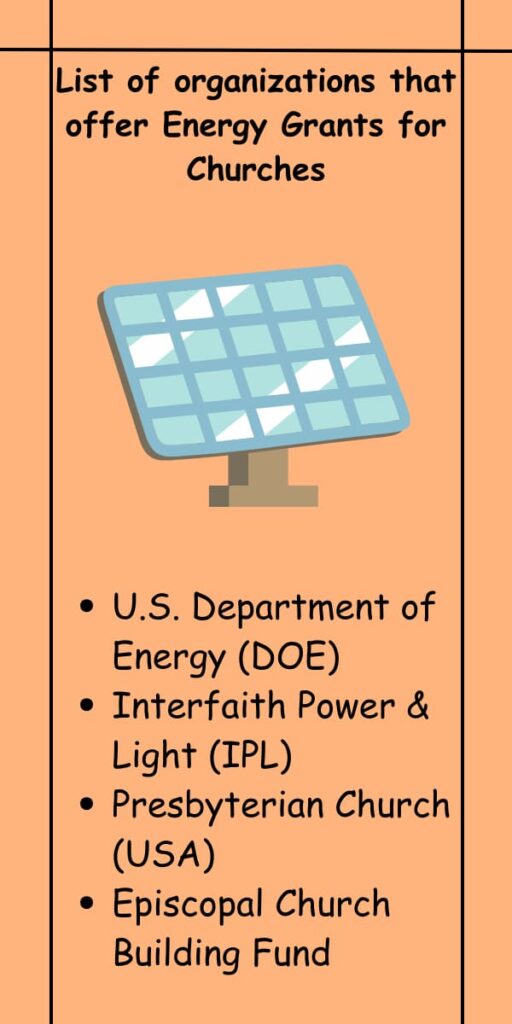
- U.S. Department of Energy (DOE): The U.S. Department of Energy (DOE) provides various grant programs aimed at promoting energy efficiency and renewable energy adoption, including initiatives tailored for churches and religious organizations. These grants may support projects such as energy audits, energy efficiency upgrades, and the installation of renewable energy systems like solar panels. The DOE offers resources and funding opportunities through programs such as the Weatherization Assistance Program (WAP), State Energy Program (SEP), and Solar Energy Technologies Office (SETO), among others.
- Interfaith Power & Light (IPL): Interfaith Power & Light (IPL) is a national organization that engages with religious communities to address climate change and promote environmental stewardship. IPL offers grants and resources to support energy efficiency and renewable energy projects within churches, synagogues, mosques, and other religious institutions. These grants may fund initiatives such as energy audits, solar panel installations, and educational programs focused on sustainability and faith-based environmental activism.
- Presbyterian Church (USA): The Presbyterian Church (USA) offers grant programs to support sustainability initiatives and energy projects within congregations. These grants may be administered through denominational offices, presbyteries, or regional bodies and are designed to help churches reduce their carbon footprint, lower energy costs, and demonstrate environmental stewardship. Funding may be available for energy audits, energy efficiency upgrades, and the installation of renewable energy systems like solar panels.
- Episcopal Church Building Fund: The Episcopal Church Building Fund provides financial support and resources to Episcopal churches for building and renovation projects, including energy efficiency and sustainability initiatives. Grants may be available for energy audits, building retrofits, and the implementation of renewable energy technologies. The Episcopal Church’s commitment to environmental stewardship aligns with the fund’s mission to help churches reduce their environmental impact and promote responsible stewardship of resources.
Conclusion:
In conclusion, several organizations offer Energy Grants for Churches to support energy efficiency and sustainability initiatives.
From federal agencies like the U.S. Department of Energy to faith-based organizations like Interfaith Power & Light, churches have access to a variety of funding opportunities to implement energy-saving measures and renewable energy projects.
By leveraging these grants and resources, churches can reduce their environmental footprint, lower energy costs, and demonstrate their commitment to caring for creation and future generations.
[the_ad id=”39205″]
Frequently Asked Questions (FAQ):
What Are Energy Grants for Churches, and Why Are They Important?
Energy grants for churches are financial resources provided by various organizations to support energy efficiency and renewable energy initiatives within church facilities. They are important because they help churches reduce their energy costs, lower their environmental impact, and contribute to sustainability efforts in their communities.
Who Can Apply for Energy Grants for Churches?
Generally, churches and religious organizations that are non-profit entities and own or lease property for their facilities can apply for energy grants. Each grant program may have specific eligibility criteria, so it’s essential to review them carefully before applying.
What Types of Projects Do Energy Grants for Churches Typically Fund?
Energy grants for churches can fund a wide range of projects, including but not limited to:
- Installation of solar panels or other renewable energy systems
- Energy-efficient lighting upgrades
- HVAC system improvements
- Insulation and weatherization enhancements
- Energy audits and assessments
- Education and outreach programs on energy conservation
How Can Churches Find Available Energy Grant Opportunities?
Churches can find energy grant opportunities by researching online databases, visiting government agency websites, consulting with energy efficiency organizations, and networking with other churches or religious groups that have received grants in the past. It’s also helpful to subscribe to newsletters or mailing lists that provide updates on grant opportunities.
Do Energy Grants for Churches Require Matching Funds?
Some energy grants may require churches to provide matching funds or in-kind contributions, while others may not have this requirement. It depends on the specific grant program and its guidelines. Churches should carefully review the grant terms to understand any matching fund requirements.
What Are the Timelines for Applying for and Receiving Energy Grants?
The timelines for applying for and receiving energy grants can vary significantly depending on the grant program’s application cycles, review processes, and funding availability. It’s crucial for churches to plan ahead, submit applications well before deadlines, and be prepared for potential follow-up steps or interviews during the review process.
Can Churches Apply for Multiple Energy Grants Simultaneously?
Yes, churches can apply for multiple energy grants simultaneously, especially if they have different focus areas or funding priorities. However, it’s essential to ensure that the proposed projects align with each grant program’s requirements and that the church can manage multiple grant applications effectively.
What Are Some Tips for Crafting a Compelling Grant Proposal?
To craft a compelling grant proposal, churches should:
- Clearly define their energy efficiency goals and objectives
- Provide detailed project plans with timelines, budgets, and expected outcomes
- Demonstrate the community impact and benefits of the proposed projects
- Include supporting data, research, and testimonials to strengthen the proposal’s credibility
- Follow the grant program’s guidelines and formatting requirements
How Can Churches Maximize Their Chances of Securing Energy Grants?
Churches can maximize their chances of securing energy grants by:
- Researching and targeting grants that align with their energy goals and projects
- Ensuring eligibility and meeting all requirements specified by the grant programs
- Developing strong grant proposals with clear objectives and detailed plans
- Engaging in proactive communication and follow-up with granting organizations
- Demonstrating a commitment to sustainability and community impact in their applications
What Resources Are Available to Help Churches Navigate the Energy Grant Application Process?
Churches can access various resources to help them navigate the energy grant application process, including:
- Online guides and toolkits provided by energy efficiency organizations
- Workshops, webinars, and training sessions on grant writing and sustainability
- Consulting services from experts in energy efficiency and grant funding
- Networking opportunities with other churches or organizations that have experience with energy grants




